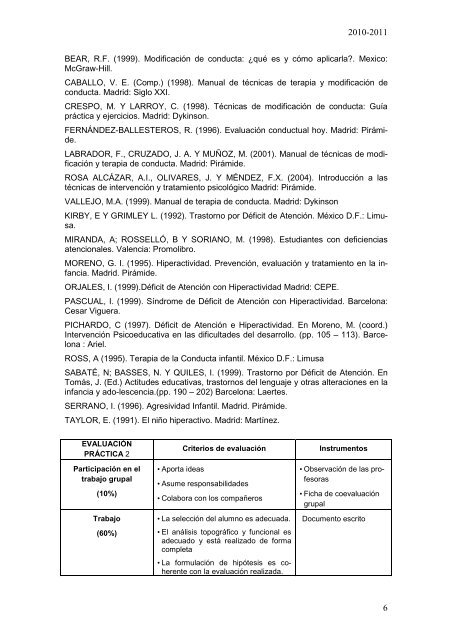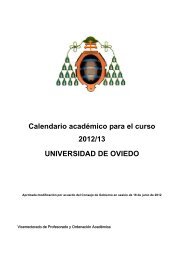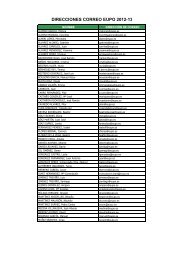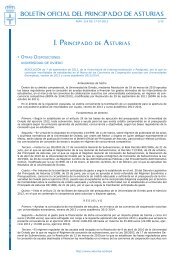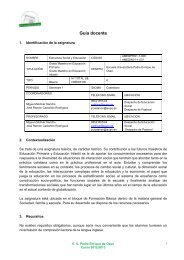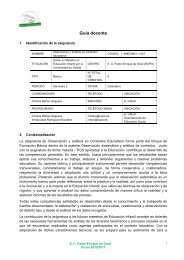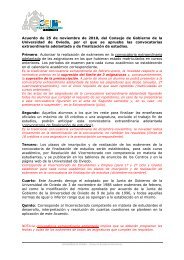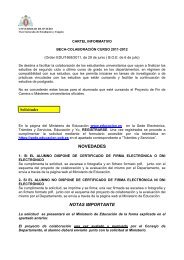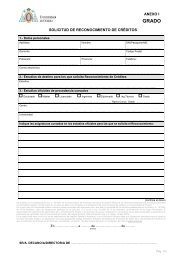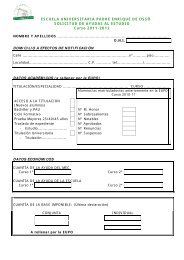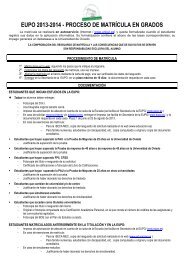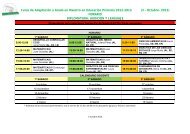Bases psicopedagógicas de la educación especial - Escuela ...
Bases psicopedagógicas de la educación especial - Escuela ...
Bases psicopedagógicas de la educación especial - Escuela ...
You also want an ePaper? Increase the reach of your titles
YUMPU automatically turns print PDFs into web optimized ePapers that Google loves.
2010-2011<br />
BEAR, R.F. (1999). Modificación <strong>de</strong> conducta: ¿qué es y cómo aplicar<strong>la</strong>?. Mexico:<br />
McGraw-Hill.<br />
CABALLO, V. E. (Comp.) (1998). Manual <strong>de</strong> técnicas <strong>de</strong> terapia y modificación <strong>de</strong><br />
conducta. Madrid: Siglo XXI.<br />
CRESPO, M. Y LARROY, C. (1998). Técnicas <strong>de</strong> modificación <strong>de</strong> conducta: Guía<br />
práctica y ejercicios. Madrid: Dykinson.<br />
FERNÁNDEZ-BALLESTEROS, R. (1996). Evaluación conductual hoy. Madrid: Pirámi<strong>de</strong>.<br />
LABRADOR, F., CRUZADO, J. A. Y MUÑOZ, M. (2001). Manual <strong>de</strong> técnicas <strong>de</strong> modificación<br />
y terapia <strong>de</strong> conducta. Madrid: Pirámi<strong>de</strong>.<br />
ROSA ALCÁZAR, A.I., OLIVARES, J. Y MÉNDEZ, F.X. (2004). Introducción a <strong>la</strong>s<br />
técnicas <strong>de</strong> intervención y tratamiento psicológico Madrid: Pirámi<strong>de</strong>.<br />
VALLEJO, M.A. (1999). Manual <strong>de</strong> terapia <strong>de</strong> conducta. Madrid: Dykinson<br />
KIRBY, E Y GRIMLEY L. (1992). Trastorno por Déficit <strong>de</strong> Atención. México D.F.: Limusa.<br />
MIRANDA, A; ROSSELLÓ, B Y SORIANO, M. (1998). Estudiantes con <strong>de</strong>ficiencias<br />
atencionales. Valencia: Promolibro.<br />
MORENO, G. I. (1995). Hiperactividad. Prevención, evaluación y tratamiento en <strong>la</strong> infancia.<br />
Madrid. Pirámi<strong>de</strong>.<br />
ORJALES, I. (1999).Déficit <strong>de</strong> Atención con Hiperactividad Madrid: CEPE.<br />
PASCUAL, I. (1999). Síndrome <strong>de</strong> Déficit <strong>de</strong> Atención con Hiperactividad. Barcelona:<br />
Cesar Viguera.<br />
PICHARDO, C (1997). Déficit <strong>de</strong> Atención e Hiperactividad. En Moreno, M. (coord.)<br />
Intervención Psicoeducativa en <strong>la</strong>s dificulta<strong>de</strong>s <strong>de</strong>l <strong>de</strong>sarrollo. (pp. 105 – 113). Barcelona<br />
: Ariel.<br />
ROSS, A (1995). Terapia <strong>de</strong> <strong>la</strong> Conducta infantil. México D.F.: Limusa<br />
SABATÉ, N; BASSES, N. Y QUILES, I. (1999). Trastorno por Déficit <strong>de</strong> Atención. En<br />
Tomás, J. (Ed.) Actitu<strong>de</strong>s educativas, trastornos <strong>de</strong>l lenguaje y otras alteraciones en <strong>la</strong><br />
infancia y ado-lescencia.(pp. 190 – 202) Barcelona: Laertes.<br />
SERRANO, I. (1996). Agresividad Infantil. Madrid. Pirámi<strong>de</strong>.<br />
TAYLOR, E. (1991). El niño hiperactivo. Madrid: Martínez.<br />
EVALUACIÓN<br />
PRÁCTICA 2<br />
Participación en el<br />
trabajo grupal<br />
(10%)<br />
Trabajo<br />
(60%)<br />
• Aporta i<strong>de</strong>as<br />
Criterios <strong>de</strong> evaluación Instrumentos<br />
• Asume responsabilida<strong>de</strong>s<br />
• Co<strong>la</strong>bora con los compañeros<br />
• La selección <strong>de</strong>l alumno es a<strong>de</strong>cuada.<br />
• El análisis topográfico y funcional es<br />
a<strong>de</strong>cuado y está realizado <strong>de</strong> forma<br />
completa<br />
• La formu<strong>la</strong>ción <strong>de</strong> hipótesis es coherente<br />
con <strong>la</strong> evaluación realizada.<br />
• Observación <strong>de</strong> <strong>la</strong>s profesoras<br />
• Ficha <strong>de</strong> coevaluación<br />
grupal<br />
Documento escrito<br />
6


